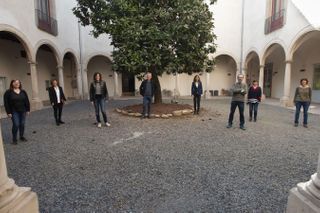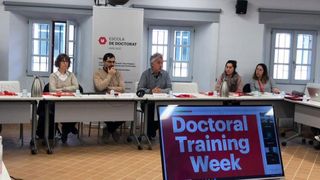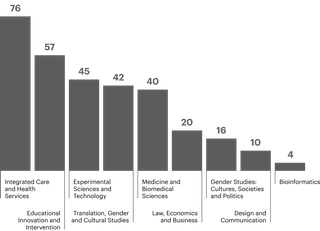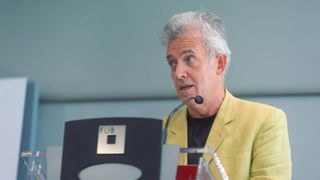The UVic-UCC Doctoral College has been working for ten years to put doctoral studies at the heart of academic activity. This founding goal has been more than met due to the Doctoral College’s firm commitment to academic quality, the recruitment of national and international doctoral students, and the solid research and professional training programme.
The UVic-UCC Doctoral College was established in April 2011 following the publication in the same year of a decree modifying the structure of doctoral courses as part of a general updating of these studies. “The main objective was to put doctoral studies at the heart of academic activity,” says Antoni Tort, the director of the college since its inception. He notes that the college “emerged as a logical, relevant subsequent stage after the study of bachelor’s degrees and master’s degrees and, above all, as a differentiated area because research is the raison d'être of a doctorate in a university institution.”
Since its inception, the UVic-UCC Doctoral College has ensured the quality of official doctoral studies. Its main areas of action are based on ensuring the academic quality of these studies, carrying out the programming and teaching planning, and recruiting national and international doctoral students to join the UVic-UCC’s doctoral programmes and research groups. It also focuses on offering a solid research and professional training programme and increasing the visibility of the Doctoral College’s activity and the results derived from theses.
“We aim to be another link in improving people’s living conditions by strengthening independent research communities and culturally enriching the societies we serve,” said Tort, who is convinced that “universities must play a relevant role in the global debate on ethical aspects that affect information, knowledge and research” and that “quality doctoral training can act as a guiding and prevention strategy in the face of the pressures, constraints and ethical dilemmas that research must address today.”

A project that added up
The creation of the UVic-UCC Doctoral College was promoted by the former Vice-Rector for Research, Marta Otero Viñas, who set up the school with lecturer Montserrat Capellas and Núria Roca as technician of the Research Transfer Office (OTRI), “two key people without whom the project would not have been possible,” says the former vice-rector. The management and the rest of the bodies that make up the current college were incorporated from October 2012.
According to Marta Otero, “the new research decree promoted by Màrius Rubiralta proposed the creation of doctoral colleges that would bring together doctoral programmes as they were taught in Europe, which were successful and efficient, to bring about a return to research.” Otero explains that it was “an amazing challenge” because “it was an overly ambitious project for the volume of research we had at the time.” She states that it took a lot of effort to convince the university community, thoroughly analyse the expertise and draw up a first list of programmes to offer. “Notably, after overcoming some initial reluctance, everyone joined in with enthusiasm,” says Otero, who considers that “it was one of the best decisions I made as vice-rector, as you can see from the way it has developed.”
Before the creation of the Doctoral College, UVic had two doctoral programmes, one on Inclusive Education led by lecturer Pere Pujolàs and another on Methodology and Analysis of Translation, led by lecturers Lluïsa Cotoner and Maria Gonzàlez Davies. The university’s first doctoral thesis emerged from the latter programme in the 2006-2007 academic year. It is entitled “Learning English through Translation: the Affectivity and Diversity Approach” by Cristina Mallol. According to Cotoner, “we decided that we needed to offer our students the opportunity to remain with us for doctoral studies because we thought it was the best way to increase the prestige of the faculty and translation studies. At that time in Catalonia, translation studies only had one doctoral programme taught by the UAB, which had just been launched.”

136 theses in a decade of the college
In its ten years of existence, 136 theses have been defended in the Doctoral College (154 in total, including those defended before the creation of the college), 85% of which received a grade of excellent, cum laude. In addition, a total of 35 industrial doctoral projects have been awarded, to develop strategic research within a company.
The college currently manages, coordinates and supervises ten doctoral programmes, the last of which, Sport and Human Movement Sciences, was launched this academic year. The UVic-UCC Doctoral College’s own programmes are: Experimental Sciences and Technology; Translation, Gender and Cultural Studies; Medicine and Biomedical Sciences; and Design and Communication, with the collaboration of BAU, Design College of Barcelona, an affiliate centre. The interuniversity programmes coordinated by UVic-UCC include Educational Innovation and Intervention, and Comprehensive Care and Health Services. Finally, interuniversity programmes coordinated by other universities include: Law, Economics and Business; Gender Studies: Culture, Society and Politics; and Bioinformatics.
Total students enrolled. Year 2020-2021

Doctoral programmes by field

What are UVic-UCC doctoral students like?
Only 15% of doctoral students pursuing postgraduate studies at UVic-UCC come from the same university, a figure far from the 53% recorded on average in Europe. This situation can be interpreted in two ways. First, “it means that there are people attracted to the Doctoral College for other reasons: the prestige of the researchers, research projects with contracting capacity and the industrial doctoral programmes, among other factors,” explains Tort. Second, it means that “our offer of master’s degrees must increase in capacity, both in terms of attracting students initially and in guiding students towards doctoral studies during the master’s degree.”
Most UVic-UCC doctoral students work on their thesis part-time. “The number of pre-doctoral contracts is low and has an impact on the ability to recruit more doctoral students and more full-time doctoral students. “This is one of the main problems that needs to be resolved to increase the quality and quantity of UVic-UCC doctoral studies,” notes the director of the college. According to him, the future lies in being more competitive in public grants, having greater international research capacity, convincing the private sector to act as a sponsor of doctoral studies, obtaining European funds and offering more UVic-UCC grants, among other factors.
The number of doctoral students with predoctoral grants has been increasing since 2011. Of the 311 doctoral students in the 2021-2022 academic year, 60 have some type of predoctoral grant or contract.
Brief history of doctoral studies

The inaugural lecture of the opening ceremony of the 2021-2022 academic year at UVic-UCC was given by the director of the Doctoral College, Antoni Tort, who described the college’s first decade of history and the origins of doctoral studies. The history of this degree, he explained, is something that has evolved according to social, political and economic circumstances. “It seems that its origins go back to the NINTH century in the Muslim world and, a little later, in medieval European universities, when a doctorate was a license to teach, rather than recognition of research achievements,” he explained.
The doctoral degree was like trade union certification, recognition by other doctors who hosted the novice doctor in a ceremony that was more of an enjoyable, social act than an academic one. It was not until the vision of Wilhelm von Humboldt, in NINETEENTH-century Germany, that the concept of a doctorate changed and came to be understood as “a preparation for research in the context of a person’s overall training.” In fact, the Friedrich Wilhelm University of Berlin (now Humboldt-Universität zu Berlin) was the first to award a doctorate that we would recognize today, as the result of a sequence of courses, followed by the completion and defence of a dissertation of original research.